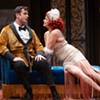Published October 20, 2005 at 12:37 a.m.
The lives of rusticated rubes and boobs in rural Georgia are turned upside down by a pale-faced British proofreader so painfully shy he pretends not to speak English. The stranger's imagined exoticism attracts some and makes others suspicious. Because no one thinks he can understand them, secrets spill like Georgia peanuts from a pickup at harvest time.
The plot of The Foreigner swerves and weaves a bit, and characters occasionally cross the line of credibility. New York theater critics got their knickers in a twist when Larry Shue's play premiered there in 1984. "Preposterous," Frank Rich harrumphed in The New York Times. But audiences outvoted them, willing to suspend their disbelief and go along for the rollicking ride, and the comedy racked up one of the longest runs in off-Broadway history.
The Vermont Stage Company kicks off its new season with a high-octane production of this frothy farce. Director Mark Nash has conceived, crafted and cast a fine Foreigner, full of oddballs and outcasts whose worlds collide in crazy ways. The feigned foreign-ness creates a host of humorous scenarios, but it also allows a timely thematic undercurrent to emerge: Xenophobia is more than evil, it's just plain dumb.
On the self-esteem spectrum, the play's protagonist Charlie is the anti-Donald Trump, with a self-image so low it's subterranean. He feels numbed by his gray job, proofreading a science-fiction magazine, and his blackened marriage -- his wife has had 23 affairs. He sees himself as terminally boring, utterly lacking a personality. "What must it be like," he wonders, "to be able to tell a funny story? To arouse laughter. Anger. Respect. To be thought . . . wise?"
Dashing British army-demolitions expert Froggy LeSueur tries to boost his friend's spirits by bringing Charlie along on his annual trip to Georgia. While the suave soldier trains Americans, Charlie is supposed to relax at Froggy's favorite mountain retreat, run by his old pal Betty Meeks.
But even the thought of making small talk terrifies Charlie, so Froggy concocts a story to keep him from having to converse with anyone: Charlie is really "Cha-Oo-Lee," a mysterious foreigner from a land Froggy can't mention for "government" reasons. Charlie's strangeness thrills Betty, displacing her worries over the possible forced sale of her inn, which the shady building inspector, Owen, is threatening to condemn.
Far from a quiet retreat, the lodge reveals itself as a hotbed of dark secrets simmering beneath the surface. Since Charlie supposedly doesn't understand a word, everyone freely rants, schemes and dreams within his earshot. He desperately doesn't want to be the center of attention, but the outsider unwittingly becomes the axis around which this increasingly loopy world turns.
Along with Betty, two other residents of the inn soon take a shine to Charlie. Catherine, an insecure and often bitchy ex-debutante, finds comfort confiding in someone who can't judge her. Her little brother Ellard, whom everyone else has pigeonholed as dimwitted, becomes Charlie's enthusiastic language tutor, eventually "teaching" him to read English in just an hour. But Catherine's fiance David grows suspicious when he can't learn more about the foreigner's background. The cherubic minister turns out to be no angel, and Charlie plays a key role in foiling his dastardly plans.
Andrew Sellon gave a delight-filled performance as Charlie, transforming his character from transparent to triumphant over the course of the play. In the first scenes, he acted out a virtual thesaurus entry for fear, shrinking from human contact, bugging out his eyes and jumping out of his skin as his character awkwardly adapts to his surroundings.
Charlie comes into his own when Froggy traps him into showing off his supposed skills as a raconteur in his "native" (nonexistent) tongue. Sellon masterfully sold the story in a hilarious mishmash of nonsensical dialect. The scene is pivotal: It forces Charlie to invent a language, much as circumstances have forced him to develop a personality. For Charlie, the mistaken identity proves to be better than no identity at all.
As Froggy, Paul Ugalde carried himself with macho swagger. Froggy can't quite believe the crazy complications his seemingly simple plan has wrought. To demonstrate Froggy's mix of bewilderment and disapproval, Ugalde used expressively arched eyebrows and sharply executed double-takes, punctuated by quickly slugged shots of alcohol. He cut a rakish figure in his close-fitting British military uniform, although the intensity of his English accent sometimes fluctuated, as did the other actors' Southern accents.
Three initially unappealing characters blossom under Charlie's influence -- Ellard, Catherine and Betty -- as their battered self-esteem recovers alongside Charlie's. Ellard is particularly sad-sack, his brow low and furrowed, his ill-fitting jeans hitched too high. Mike Mosey skillfully captured Ellard's progression from cowed to confident as the shy boy learns to hold his head up.
The women warm to Charlie: Catherine gains a confidante and Betty develops a crush. As Catherine sheds the shrill, demanding prima-donna behavior that stems from her insecurity, Haley Rice gradually revealed the ex-deb's layers of vulnerability, sweetness and, ultimately, old-fashioned, Southern feminine grit. Betty's self-assurance grows as she becomes convinced she has a special, telepathic level of communication with the exotic visitor. Lili Gamache showed how Betty's depression dissolves: Her smile grew brighter; her step became lighter.
While the weak characters gain strength, the villains become frustrated as the foreigner gets in their way. As the redneck, racist Owen, Wayne Tetrick seethed and stalked with maniacal menace. Lane Gibson Jr. tackled the subtler role of Rev. David Marshall Lee with equal gusto. He played the sweet-faced minister with an even-keeled charm that concealed the "sin" in his sinister schemes.
The action unfolded on an inviting, fishing-lodge set created by scenic designer and technical director John Paul Devlin. Unfinished pine floors and paneling, along with eclectic, mismatched furniture, established a rustic tone. Homey details abounded: glass Coke bottles on the cornflower-blue sideboard, a '50s-era dinette set with red, vinyl-backed chairs, and a spoon rack for Betty's prized souvenir collection. Fishing gear dotted the room, including wall-mounted specimens and nets, a wicker creel and a "gone fishin'" sign. The opening scene's heavy rainstorm sound-effect enhanced the sense of settling in to a cozy environment.
Colorful costume flourishes illustrated aspects of the characters' social standing or state of mind. Catherine cares deeply about dressing well for her fiance, but she has a backwoods, blue-collar definition of glamour. Costume designer Jenny Fulton put her in a sequined teal top, paired with pink suede shoes and, later, a fuchsia bathrobe, embroidered with black satin cats, and feathery, pink bunny slippers. Owen is at another end of the rural Georgia spectrum, scary in his black, torn and faded Lynyrd Skynyrd T-shirt.
The intimacy of the FlynnSpace provided an ideal venue for staging The Foreigner. With the audience surrounding the set on three sides, and a low ceiling, dialogue was easy to hear, even when actors faced the back of the set or schemed sotto voce. But more importantly, the close quarters enhanced the sense of the audience and the actors embarking together on an adventure, a silly foray into the seemingly harmless fantasy of pretending to be someone we're not.
More By This Author
Speaking of...
-

Executive Director Kurt Thoma Leaves Barre Opera House
Mar 5, 2024 -

Vermonter's Musical Bound for Broadway With Hillary Clinton as a Producer
Oct 25, 2023 -

Phantom Theater Finds New Winter Venue in Waitsfield
Oct 13, 2023 -

Double E 2023 Summer Concert Series Kicks Off With the Wailers
Mar 17, 2023 -

Off Center for the Dramatic Arts to Reopen in the New North End
Sep 23, 2022 - More »
Comments
Comments are closed.
From 2014-2020, Seven Days allowed readers to comment on all stories posted on our website. While we've appreciated the suggestions and insights, right now Seven Days is prioritizing our core mission — producing high-quality, responsible local journalism — over moderating online debates between readers.
To criticize, correct or praise our reporting, please send us a letter to the editor or send us a tip. We’ll check it out and report the results.
Online comments may return when we have better tech tools for managing them. Thanks for reading.













































